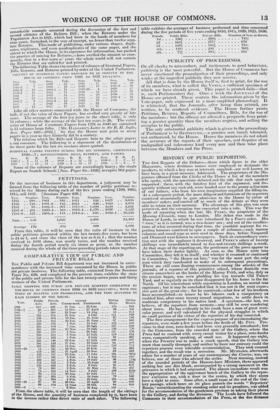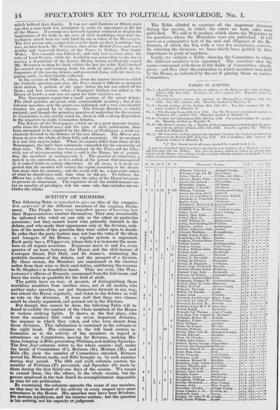HISTORY OF PUBLIC REPORTING.
THE first Reports of the Debates—those which figure in the older Magazines, where fictitious names were employed to designate the speakers, to which it key was at intervals supplied—are well known to have been, in a great measure, fabricated. The proprietors of the Ma- gazines attained from the Clerks of the House a list of the members who spoke, with the questions debated and the side that each speaker supported : these, with the briefest hint of the argument, and fre- quently without any such aid, were handed over to the penny-a-line man. of our fathers, who from his own imagination supplied the filling-in. At a subsequent period, the more diligent and fortunate of the reporters contrived occasionally to gain admission to the House by virtue of members' orders, and carried off as much of the debate as they were able to retain on their memory. The advantage of this plan was soon perceived, and the exception was converted into a rule. This was the mode of reporting when the late Mr. PERRY, the proprietor of the Morning Chronicle, came to London. His debut was made in the House of Lords, to which he was introduced by a Peer's order. His " turn," as it is termed, was a two-hours' one; and out of the recollec- tions of what occurred during that time, the youthful aspirant for re- porting honours contrived to spin a couple of columns—such narrow columns and round type as were used in those days, before Nonpareil and Diamond were known in newspapers. Such an extraordinary exer- tion met with the applause it deserved, and PERRY'S salary of twenty shillings was immediately raised to five-and-twenty shillings a-week. At that stage of the reporting art, the gentlemen of the press appear to have taken their duties lightly. As soon as the House went into Committee, they left it to itself; and whether it resumed or continued ill Committee, "the House sat late," was for the most part the only note which they vouchsafed to make of its subsequent proceedings. There are still some floating reminiscences among the attaelds of the journals, of a reporter of this primitive school, whose domicile waa situate somewhere on the banks of the Murray Frith, and who, duly as the session began, was seen plodding his way towards Old Palace Yard, and as regularly on its close disappeared for his home in the far North. Of his whereabout while sojourning in London, no mortal was cognizant ; but it may be concluded that it was not in the most exper... sive part of the great city ; for he contrived—what few of his brethren have accomplished—to amass by his labours such a competency as enabled him, after some twenty annual migrations, to settle down in. moderate competency in his native land. A specimen—the last, we believe, of the reporters from memory—may still be seen wandering about town. He has evidently in his youth been a man of great mus- cular power, and well calculated for the physical struggles in whick no small portion of the virtue of the reporters of his day consisted. The first arrangements for the express purpose of accommodating the reporters, were made a few years before the death of Mr. PITT. Pre- vious to that time, note-books had been very generally introduced ; but in the Commons, from the crowded state of the Gallery, where the Press had to contend with every casual visitor for a place, note-books were, comparatively speaking, of small use. It happened one night, when the Premier was to make a crack speech, that the Gallery was more than usually thronged, and neither by force nor entreaty could the reporters procure even tolerable accommodation. They took counsel together, and the result was a secession. Mr. MUDFOHD, afterwards editor for a number of years of our contemporary the Courier, was, we believe, one of those who advised the strike. Next morning, instead of the rounded periods of the Heaven-born Minister, there appeared nothing but one dire blank, accompanied by a strong comment on the grievance in which it had originated. The almost immediate result was the appropriation of the uppermost bench of the Gallery to the repor- ters' exclusive use, with a door in the centre, by which they alone have a right to enter. Soon after, a small room at the end of the Gal- lery passage, which bears on its glass pannels the words "Reporters' Floorn,"notwithstanding the standing order and its penalties, was added for the accommodation of the gentlemen previous to taking their places in the Gallery, and during the divisions. The Lords have followed the Commons in their accommodation of the Press, at the due distance which befitted their dignity. It was not until fourteen or fifteen years ago that a note-book was permitted to make its appearance at the bar of the House. If a young or a forward reporter ventured to display the implements of his trade to the eyes of their Lordships, they were im- mediately struck from his rude hand by one or other of the Messengers. The first person who ventured to rest his book on their Lordships' bar, was, we have heard, Mr. WINDYER, then of the British Press, and now a worthy and respected Justice of the Peace in Sydney, New South Wales. The example was followed ; and only two sessions after, the robe of Lord ELDON, while his Lordship was proceeding to the bar to receive a deputation of the Lower House, having accidentally caused Mr. WINDYEIt to drop his book within the bar, the noble Earl checked his onward step, and stooping from his pride of place, picked up the fragments of the passing debate, and presented them, with his most en- gaging smile, to their humble collector.
In the session of l89,8-9, when, from the intense interest to which the Catholic question gave rise, the Press found it difficult to maintain their station, a portion of the space below the bar was railed off for them ; and last session, when a Strangers' Gallery was added to the House of Lords, a seat was set apart for their exclusive use.
The Newspapers report but a small portion of the actual debate. The chief speeches are given with commendable accuracy ; but of the inferior speeches, only the points are indicated, and a very considerable number are passed by in silence. The Private Business is wholly omitted ; and though the primitive practice of neglecting the discussions in Committee is not strictly acted on, there is still a strong disposition in the reporters to slight Committee debates.
The defects of the Newspapers, which are in a great measure insepa- rable from the limited space and the time of their publication, have been attempted to be supplied by the illirror of Parliament, a work ex- clusively devoted to the debates of the two Houses. The Mirror pro- fesses to give the whole of them fully and accurately. Of its accuracy it is not very easy to judge. Where its reports differ from those of the newspapers, the latter have commonly contended for the superiority of their own. The Mirror has been accused by the Times and the aro- miele, not of misrepresenting what is said in the House, but of permit- ting the members to misrepresent it. The practice of submitting a
speech to the correction, as it is called, of the person that pronounced at, is indeed liable to serious objections. In all cases, it is to be ex- pected that the member will correct the report according to his discre- tion more than his memory; and the result will be, a transcript rather
of what he should have said, than what he did say. To fulness, the Mirror has a fair claim, except where the rules of the House interpose to prevent its attainment. The reporters of all the establishments en- joy an equality of privileges, and the same rule that excludes one ex- cludes the whole.



















































 Previous page
Previous page